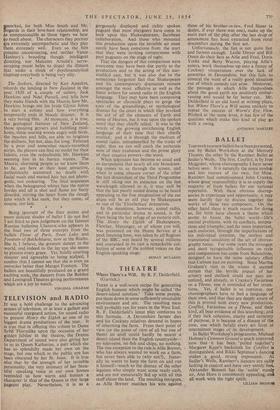TELEVISION and RADIO IT was a bold challenge to the
advancing armies of television, or at least a gallant and successful rearguard action, for sound radio to present Henry the Eighth as one of its biggest drama productions of the year. It is true that. in offering this tribute to Dame Sybil Thorndike upon the occasion of her golden jubilee in the theatre, the Drama Department of sound were also giving her to us as Queen Katharine, a patt which she has so splendidly made her own on the stage, but one which in the public eye has been obscured by her St. Joan. It is true also that by the strength of her invisible personality, the very intimacy of her beau- tiful speaking voice in our own homes reminded us how warm and human a character is that of the Queen in this large Pageant play. Nevertheless, it is as a
gorgeously displayed and richly spoken pageant that most playgoers have come to look upon this Shakespearean, Jacobean collaboration. And those who mounted this production upon the invisible air must surely have been conscious from the start that they were inviting comparisons with past pageants on the stage of sight.
That the dangers of this comparison were overcome may have been due partly to the production and to the acting of this star- studdcd cast, but it was also due to the sometimes forgotten fact that Shakespeare and his contemporary dramatists remain amongst the most effective as well as the finest writers for sound radio in the English language. They may have been composing spectacles or chronicW plays to gorge the eyes of the groundlings,' or mythological dramas for the court in which they invoked
the aid of all the elements of Earth and some of Heaven, but-it was upon the spoken
word that they chiefly relied. It was in the words of the growing enrichening English language of their time that they chiefly exulted; and it is through the medium of sound radio, untrammelled by the tricks of sight, that we can still catch the authentic note of their exultance and the prime glory of their creative powers—the word.
When television has become so usual and so inexpensive that nearly all our broadcast- ing comes to us through the screen, and when in some obscure corner of the ether the last descendant of the Third Programme is still eking out its existence on the last wavelength allowed to it, it may well be that the last purely sound drama to be heard appealing to the free imagination of the ear alone will be an old play by Shakespeare or one of the `Elizabethan' dramatists.
In the meantime, however, sound radio, and in particular drama in sound, is far from being the last refuge of an esoteric cult.
The Henry the Eighth of Shakespeare, Fletcher, Massinger, or of whom you will,
was presented on the Home Service at a peak listening hour, was taken by all Regions of the BBC, was heard by several millions and contained in its cast a remarkable col- lection of some of the noblest voices on the English-speaking stage.
MORAY MCLAREN


































 Previous page
Previous page